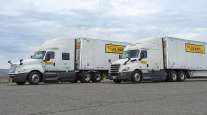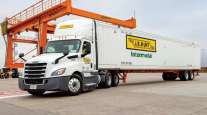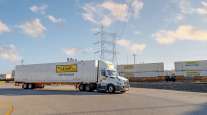Staff Reporter
J.B. Hunt Reports Q1 Revenue Increased to $2.6B

[Stay on top of transportation news: Get TTNews in your inbox.]
J.B. Hunt Transport Services saw revenue and earnings increase due to strong segment growth during the first quarter of 2021, the company reported April 15.
The Lowell, Ark.-based transportation and logistics company reported net earnings of $146.6 million, or $1.37 a diluted share, for the three months ending March 31.
That compared to net earnings of $104.8 million, 98 cents, during the same time last year. The total revenue increased by 15% to $2.62 billion from $2.28 billion.

Roberts
“We entered 2021 with a cautious, but informed, positive outlook on what we could expect in terms of demand and inventory replenishment needs from our customers,” J.B. Hunt CEO John Roberts said during a conference call with investors. “Aside from the temporary disruptions presented by weather events in February, most of the data supports a generally optimistic view of those expectations and encourages our direction going forward.”
Roberts added that the company has determined that an increase in its capital investment plan is warranted given current market conditions and the needs of customers. Because of that the company is announcing a 40% increase in its originally stated plans to enable the procurement of incremental containers, trailers and the needed supporting equipment such as chassis and tractors. The new projection for capital investments reached $1.25 billion for the year.
The results were better than expectations by investment analysts on Wall Street, which had been looking for $1.18 per share and quarterly revenue of $2.48 billion, according to Zacks Consensus Estimate.
The intermodal segment reported Q1 2021 revenue increased 2% to $1.18 billion compared with $1.15 billion during the same time last year. That reflects a 3% decrease in volume from weather-related events being offset by a 5% increase in gross revenue per load. Operating income increased 5% to $107.5 million from $102.3 million. The net income reflects an $8.2 million accrual related to adjusted calculation of the revenue divisions owed to BNSF and a one-time $4 million COVID-related bonus.
The dedicated contract services segment reported revenue increased 7% during the most recent quarter to $580 million, compared with $541.7 million during Q1 2020. This is reflective of productivity increasing approximately 5% from a year ago primarily from higher utilization of assets, contracted indexed-based price escalators and less equipment idling. An additional 203 revenue-producing trucks were in the fleet by the end of the quarter. Operating income increased 2% to $74.3 million from $72.9 million last year.
The integrated capacity solutions segment reported revenue increased 56% during the most recent quarter to $525 million from $335.5 million last year. The revenue growth was driven primarily from a 58% increase in revenue per load, which was favorably impacted by higher spot and contractual rates — this despite segment volumes declining 1% from the prior year because of customer freight mix changes. Operating income increased to $7.3 million during the recent quarter from an operating loss of $18.9 million during the same time last year.
The final-mile services segment reported that revenue increased 31% to $202 million during the recent quarter from $153.6 million during the same time last year. Stop count within the segment increased 37% during the quarter because of additional multiple customer contracts implemented over the last year. Productivity decreased approximately 4% compared to the prior-year period primarily from a shift in the mix of business between asset and asset-light operations. The operating income for the quarter was $8.5 million, compared to an operating loss of $3.3 million last year.
The trucking segment revenue increased 43% to $150 million during the recent quarter compared with $105 million during the same time last year. This was a result of a 6% increase in load count, a 38% increase in revenue per load and an 8% increase in average length of haul. Operating income for the segment increased 472% to $10.2 million from $1.8 million last year. This was partially due to increased load counts and revenue per load being partially offset by increases in purchased transportation expense and higher salary and wage expenses for nondriving personnel. The prior-year period also accounts for a one-time $500,000 COVID-related bonus.
J.B. Hunt also reported that total freight transactions in its J.B. Hunt 360 platform increased to $443 million in Q1 compared to $294 million in the prior-year quarter. This was driven by third-party dray, independent contractor and power-only capacity costs through the platform during the quarter.
Cowen and Co. was impressed by the quarterly growth and highlighted the integrated capacity solutions segment for its 56% increase in revenue. “JBHT posted an impressive 1Q on both the top- and bottom-line despite impacts from February storms,” Cowen analyst Jason Seidl wrote in the report. “The company had 56% growth in its ICS segment due to favorable impacts from spot and contract rates. Management reset expectations on LT margins, cautious commentary that was foreshadowed in 4Q.”
J.B. Hunt Transport Services Inc. ranks No. 4 on the Transport Topics Top 100 list of the largest for-hire carriers in North America. It also ranks No.5 on the TT list of the 50 largest logistics companies in North America.
Want more news? Listen to today's daily briefing below or go here for more info:




